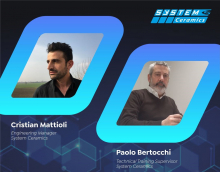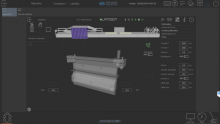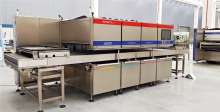
26 May 2021
"I’m going to explain to you why Prime is the present and future of industry". Cristian Mattioli talks about the software made in System Ceramics.
When we talk of industry 4.0, we think of a digital revolution which is affecting all aspects of the industrial world. It would seem to be a real paradigm shift, wouldn’t you say?
Certainly. I don’t think it’s an exaggeration to say that it’s a revolution of a way of thinking, a different way to approach any context. Industry 4.0 makes it possible to measure an objective reality; it provides you with numerous tools to better understand what a phenomenon represents (machine, time, function). The point of view in dealing with determined processes changes somewhat: thanks to 4.0 we can finally see many things, lots of small details, that were hidden before or were not even taken into consideration, simply because it was not possible.
The key to everything is data and knowing how to use them: data permits knowledge, on the basis of which it’s possible to then construct your own production philosophy in a precise and clear manner.
What, in your opinion, is the state of the art of digitalization in the ceramics sector?
In the last few year operators in the ceramics sector have certainly shown increasing interest in 4.0. I believe this due to growing awareness of the extraordinary potential offered: having a digital product that allows you to see your plant from a different point of view, with a data-driven vision, is certainly seen as a driver for growth, a natural evolution of the production process. At the same time, a businessman today knows that relying on digital is the right path to take not to be left behind and in order to exploit the opportunities of a sector that is evolving quickly and which doesn’t leave any room for any sort of inertia.
What can we expect in the next few years? How do you think the ceramics industry will evolve in the future?
The digital world is in constant flux; it never stands still and has a potential which is impossible to imagine. What will happen though, is an improvement in the decision-making process at all levels. I’ll try to explain better. What leads us to make decisions is a very complex process, as the variables in play are so many; to be able to decide, we use a mix of elements, data, sensations, experiences, our physical and emotional state, plus a touch of magic. And it’s in that moment that the digital approach can make the difference. Imagine if decisions were formalized and implemented through an evolved interface able to classify them on the basis of the effects on production: we will be able to have an historic record of our decisions which will reflect how we decide, and also more bases for algorithms that will evolve over time and which will represent our decision-making nature.
Tell us a little about your team. How may and what professional figures work in the Prime team? How do you interact with the other System Ceramics R&D departments?
We’re a team of 20 people, set up in 2016 with the idea of creating an exceptional software for the management of entire factories. We started with 5 members and grew exponentially year after year along with the growing interest that the market had in our work. We adopted right from the start an agile methodology for managing all our processes.
When we talk to our customers of the importance of digitalization we do so from experience as we apply the digital model every day to ourselves. Our mantra is “Trace, Understand, Automate” from the point of view of continuous improvement. Inside our Team information must be public, easily accessible and shared in order to be able to promote end-to-end responsibility in each one of us. When something doesn’t work everyone feels the urge to put it right; when we identify a waste, we all want to eliminate it; when we achieve success, we all benefit from it.
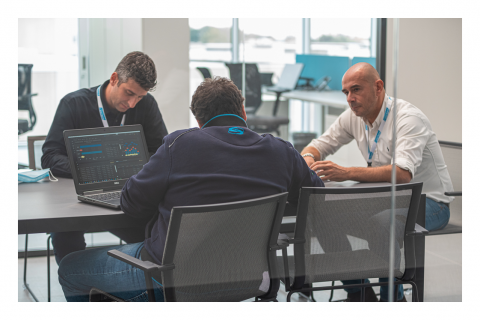
I’m very proud of the Team as the passion for what we do is evident; you see it in the relationships and in our product and when the customers point this out it takes on a special value. There are various professions in the team, but all come from the IT area with one common denominator: attention to data. Everyone that works on the Prime product, in full harmony with all the company departments, has the same objective, that of digitalizing the production process at an ever-deeper level. We have no limits.
What is the impact that Prime can have in the daily production of a ceramic company? In other words, the better the process, the better the product: how can Prime improve the quality of the ceramic product?
Prime applies a common operating mode to all the production machines. I’ll give you some examples: Prime standardizes how an order is processed, how a recipe or parameter is changed or how an emptying workflow is implemented. It is also an infinite source of prompt and precise data that are collected during the entire production phase. Track is kept of every single aspect relating to every single surface produced. This helps to assess, in real time and in a complete way, a series of key factors that inevitably influence the quality of the ceramic product, highlighting the relationships between the process variables. Consider, for example, the importance of having an immediate feedback on quality: every machine is connected to Prime and sends in real time all the data on the state of production, highlighting any defects detected on the surfaces, problems in the decoration or structure, and so on.
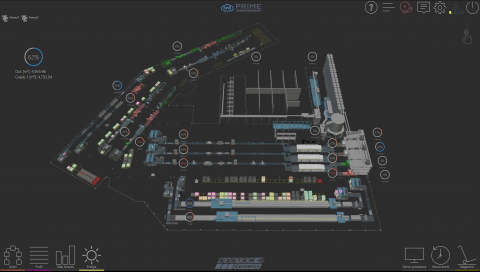
Thanks to Prime, it’s possible to extract the data from every machine, aggregate them and compare them with historic data, thereby facilitating every decision useful for making concrete improvements in all the production phases. Any production problems can be corrected in a very short time, with enormous business benefits.
How important is the human element in the Prime ecosystem? Prime is a tool exclusively for technicians, or can it be used by all the professionals in the company?
The human element is, and will always be, fundamental, also with regards to industry 4.0 and digitalization. It’s true that humans need the support of artificial intelligence, but the opposite is also true; without humans, artificial intelligence will never be able to grow, because it’s precisely thanks to the inputs that arrive from the human mind that the machines will be able to autonomously perform their tasks.
4.0 is a knowledge-enabler, a data-reading facilitator that allows humans to dedicate energy towards other aspects no less important in the production processes: there are, in fact, numerous activities that cannot be made possible and effective through algorithms. Reference can be made to creativity or intuition, for example, intrinsic aspects of the human mind.
In addition, Prime is a people-oriented tool, created to be used across the board by all the figures inside a company, not only by professional technicians. The interface is user-friendly, with attractive and intuitive 3D graphics, simple to use and immediate. Through Prime, it’s equally possible to change a single parameter of the machine from a technical point of view and to take business-oriented decisions such as the control of costs, pricing activities or production strategies. This is fundamental for company management.
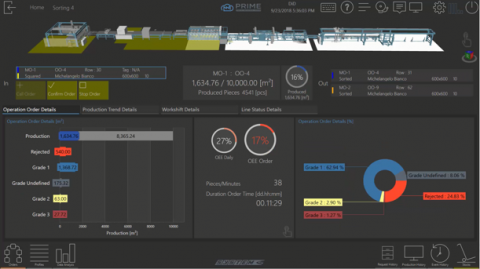
What role does the feedback you receive from customers have, and how do you use it in the team?

It’s essential. We’ve implemented the Prime Service Desk IT system that is effectively the central point of communication between us and our customers. Thanks to PSD, our customers can report anomalies, make requests, proactively propose improvements, define priorities and share the status of our applications. It allows for easy-to use, constant and tracked communication that helps all of us and the customer too. We obviously regularly organize direct meetings with our customers to receive their feedback and to listen to their needs, so that we can understand how we can improve Prime. Our objective is always to satisfy the customer and, at the same time, stimulate their curiosity and support them in every phase of production digitalization.
Related articles:
#ReLive TecnaNext. From Prime to Remote Assistance: the industry is definitely smart. Cristian Mattioli & Paolo Bertocchi's speeches
Giulia Catti, Ceramiche Mariner, describes System Ceramics' Prime
